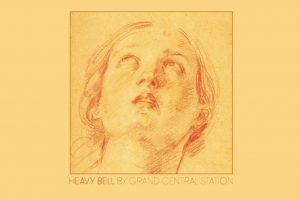
The pain was unbearable
But I did not want it to end
It had operatic grandeur
It lit up Grand Central Station like Judgement Day
Elizabeth Smart, By Grand Central Station I Sat Down And Wept
Almost everyone has some memory of New York City to be fond of, even without having been there. Be it some corner in Central Park, some glimpse of a view from a ferry, some sound of car horns or human laugh. If an alien landed on Earth and secretly roamed the streets of Manhattan, it would surely think: “This must be the place where life was born on this planet”.
Some of these feelings of confused exhilaration and of infinite loneliness are reflected in the ambitious (but devout) tribute Heavy Bell dedicate to Elizabeth Smart and her prose poem, “By Grand Central Station I Sat Down And Wept”, a lesser known masterpiece of the last century in which she recounts her love story with another writer, George Barker. Heavy Bell is in fact a new collaboration project, between Matt Peters (of the R’n’B-tinged indie-rockers Royal Canoe) and actor/songwriter Tom Keenan, both active in the Winnipeg music scene.
The album actually feels more of a collective effort, in terms of arrangements at least, but at the same time there is a clear, unified concept behind the instrumentation (very classical blend of piano, acoustic guitar, horns and strings in a chamber-like setting, with a polyphonic vocal section) and the songwriting choices. In this latter respect, the mixture of traditional songwriting and gospel/R’n’B is perfectly accomplished (the superb coda in ‘O Waste of Moon’, the lunar soul of ‘Monterey’). By now it should be an easy guess that the top reference to frame the record is Sufjan Stevens (‘Phoenix Of Love’, ‘Time For Such A Word’), even though the songs are understandably less melodic and “thematic”, to let the lyrics breathe and stand out. At some point, even, the recordings of Elizabeth Smart reading excerpts from the poem will take the stage, with the barest accompaniment (‘The Pain Was Unbearable’, which is probably the emotional height of the record, a fusillade of memorable lines). In all this lies the great respect and devotion of the project towards the literary work it’s embedded in.
At the same time, we are talking about a very lively, sometimes even bold album, that also has a very strong “performative” signature (the gentle crescendo of ‘Certainly’, the exhilarating uptempo in ‘It Has Happened’), as all of the songs can be imagined in their “staged” version. The project was in fact inspired by watching a staging of the same poem by the Winnipeg Contemporary Dancers, a few years ago. There is in general a definite Canadian indie-rock tinge to some of the songs, as in ‘I Am Going To Have A Child’ or in the slightly overstated finale (‘All The Paraphernalia’) – the same sense of grandeur, the emphatic delivery, that one can find in Spencer Krug’s (Wolf Parade, Sunset Rubdown) work, for instance.
The only slight critique that one could make is that the songs sometimes feel like “lagging behind” their literary counterpart in terms of tone and complexity, but this remains a very sensible and generous piece of work, that stands out as one of the greatest examples of bond between literature and music in this decade at least.
Words: Lorenzo Righetto
